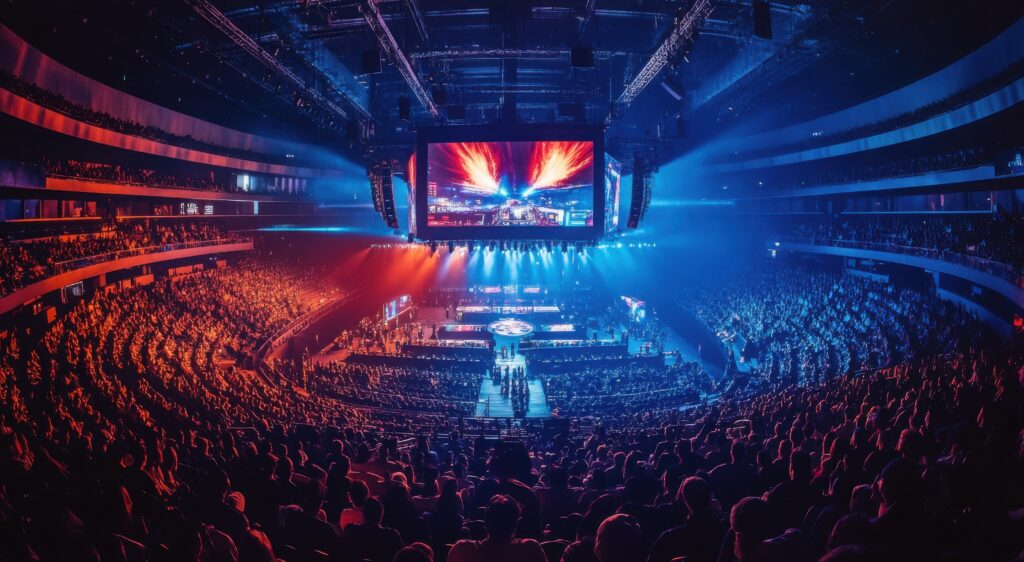SVG | Winter X Games Live: ESPN Embarks on Global Expansion With Revamped Production Model
By Jason Dachman, Managing Editor
2012 marks the dawn of a new era for ESPN’s X Games. The action-sports series will double the number of annual events from three to six, beginning with the 17th edition of Winter X Games this week in Aspen, CO. The move is part of a global push by ESPN that will see new X events in Foz du Iguacu, Brazil; Munich; and Barcelona join previously established events in Aspen, Los Angeles, and Tignes, France.
Doubling the number of events has forced ESPN to drastically rethink how it produces and distributes the X Games — both in the U.S. and abroad. In that vein, the ESPN brain trust has developed a cookie-cutter–style production model that will be essentially duplicated at all six X Games this year. The new workflow reduces on-site staff and gear, while using ESPN’s Bristol, CT, broadcast center as a de facto IBC (International Broadcast Center) for graphics insertion, features editing, live-feed integration, global distribution, and more. The revamped production model debuts this week in Aspen.
“The new production model and the global expansion are obviously tied together,” says Chris Calcinari, VP, remote operations, ESPN. “If we want to grow this and make a business for six events a year, we simply have to become more efficient. So we cut about 50 people from [the on-site crew] and put more of the burden on Bristol. That means huge savings and allows us to do more events.”
New X Workflow: Aspen to Bristol and Back
ESPN has moved a large chunk of its previously on-site operation, including almost all features/highlights-editing and graphics-insertion staff and facilities, back to its broadcast center in Bristol. As a result, Aspen and Bristol are intimately connected, exchanging files and live video feeds via a 1-GB fiber path that runs through Denver.
“Bristol is basically our IBC now,” says Senior Operations Manager Severn Sandt. “There has been an amazing amount of collaboration between Bristol and our people to make this work. That includes several key areas, especially transmission, file transfer, and the studio group.”
The on-site team transmits four MPEG-4 live feeds from both Venue A (SlopeStyle and SuperPipe) and Venue B (all other events) back to Bristol: discrete left-eye and right-eye dirty feeds (for the 3D telecast, with the left eye serving the 2D ESPN domestic telecast), a world feed that features only non-sponsored graphics, and a clean feed. In addition to these eight feeds, the Aspen team sends back feeds from two cameras on its X Games studio set (which are cut together in Bristol) and a beauty shot that takes the place of studio and sponsored elements in the world feed.
“We have 17 transmission circuits leaving here and five coming back this year,” says Larry Wilson, operations manager, ESPN. “In the past, we would consolidate everything here and deliver the finished product from Aspen. But now we are giving all those individual feeds back to Bristol and letting them assemble it all there.”
ESPN is utilizing a combination of owned Ericsson encoder/decoders and rented Adtec decoders (for the 3D feeds) to deliver the video back to Bristol.
Once these feeds arrive in Bristol, ESPN performs graphics insertion (only one floating Vizrt graphics machine is running on-site for basic graphics), and then the feeds are used for a variety of linear-telecast feeds around the world. In addition to the domestic ESPN 2D and 3D network feeds, ESPN provides an English world feed, non-English world feed, and non-sponsored world feed, as well as customized feeds for Brazil, Spain, and Germany (not coincidentally, the three new X Games sites) that feature corresponding sponsor elements and graphics. ESPN sees these customized feeds and ability to insert specific sponsor graphics for different countries as prime sponsorship opportunities moving forward.
“I know I’m not the sponsorship guy, but I believe the value proposition we are creating for our partners in Brazil, Spain, and Germany is unprecedented,” says Phil Orlins, senior coordinating producer, X Games. “For us to produce the world feed coverage, push it back to Bristol, and then send it out to countries with unique sponsorship elements or clean of any sponsorship elements if they wish – and without them having to even show up on-site – is pretty impressive. If they want to come on-site and do V-O at home, it’s going to feel like its their own [telecast].”
File-Exchange Galore
ESPN worked closely with EVS and Broadcast Fusion (as well as with Signiant for file-transfer applications) to develop a comprehensive file-based architecture that allows Aspen and Bristol to easily exchange content over the 1-GB fiber path.
This workflow has three tiers. First, all live feeds are ingested at ESPN into Quantel- and Avid-based editing facilities at Bristol and are made available in real time to all users on Bristol’s network. Second, certain special clips (a big trick or crash, for example) are flagged by an operator, who automatically sends it to Bristol by putting a specific character in the clip’s title. Third, Bristol editors can browse all content from Aspen via lo-res H.264 proxies and request that the hi-res file be transferred to Bristol.
The EVS network is comprised of 11 EVS XT2 servers (six for Venue A and five for Venue B) and an EVS SpotBox for both venues. ESPN utilizes a Dulce storage system to house the flagged and unflagged media, as well as the media delivered from GoPro (which is on on-site capturing unique angles of the competition with hundreds of miniature cameras) in Aspen.
“A lot of this has been experimenting with different technologies, finding issues, and saying, so how are we going to figure this out now?” says Steve Raymond, associate director, event operations. “We could test all the technologies individually but really couldn’t see how it all worked together until we all got on-site here.”
Much of the metadata assignment is still performed on-site, but ESPN is working towards moving that to Bristol as well.
Going Global
This phenomenally complex and sophisticated workflow all boils down to one thing: growing the X Games internationally. By creating a cheaper on-site production model and allowing Bristol to distribute X Games content abroad like never before, ESPN believes it is on the brink of turning the X Games into a truly global brand and live-event series.
Acccording to ESPN, Winter X Games Games will be televised in more than 192 countries and territories to more than 232 million homes. The event will also be simulcast on ESPN’s international broadband platforms in 13 countries. And that is likely only the beginning as ESPN begins it’s international quartet of X Games in Tignes, France on March 20.
“A whole new dimension has opened up for us in serving international-rights holders,” says Sandt. “ESPN International has been around for a while, but there has not been a really strong effort to sell our content to other customers. We’ve never had a world feed until now. But this now opens up those kinds of opportunities.”
While Norway’s NRK, Japan’s NHK, Brazil’s RedeTV, ESPN Argentina, ESPN International, and a handful of others are on hand with commentary positions or standups, most international-rights holders have opted to take the world feed (clean or dirty, depending on the outlet) and apply commentary at home.
“We basically have an IBC in Bristol for international distribution, so we give them the world feed, and they make their show,” says Paul DiPietro, coordinating director, event operations. “However, in the future, our hope is to someday get that line of booths with different announcers from international carriers — very much like an Olympics or World Cup. There is so much potential for growth with [the X Games]; we think it’s just matter of time.”


